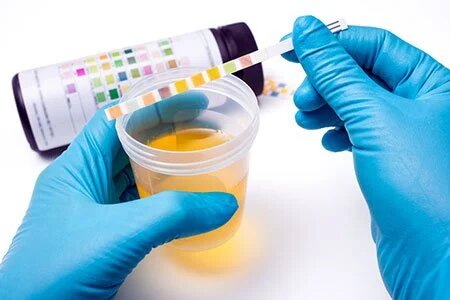
A Complete Urine Routine Examination, often referred to as a Urinalysis, is a common test used to check the composition of urine. It plays a critical role in diagnosing and monitoring various health conditions, from urinary tract infections to kidney disease. In this blog, we delve into what a Complete Urine Routine Examination entails, why it’s important, and what you can expect from the normal ranges of results, especially if you are visiting a pathology lab in Kolkata.
What is a Complete Urine Routine Examination?
A Complete Urine Routine Examination is a comprehensive test that analyzes different components of urine to provide valuable insights into an individual’s health. This test assesses various physical, chemical, and microscopic aspects of urine, helping in the early detection and management of many diseases.
Components of the Examination:
Physical Examination: Evaluates the urine’s color and clarity. Typically, urine should be clear and range from pale yellow to amber, depending on hydration levels.
Chemical Examination: Uses a dipstick test to check for substances such as proteins, glucose, ketones, bilirubin, blood, and pH level. The presence of these substances can indicate specific health issues.
Microscopic Examination: Involves examining the urine under a microscope to identify cells, bacteria, crystals, and other substances that cannot be seen with the naked eye.
The Importance of a Urine Routine Examination:
This test can be used to:
- Detect infections: Presence of white blood cells, bacteria, or pus can indicate a urinary tract infection.
- Monitor kidney function: Abnormal levels of proteins or blood in urine can be early signs of kidney disease.
- Diagnose metabolic conditions: The presence of glucose and ketones can help in diagnosing diabetes.
- Assess general health: Urinalysis is part of a routine medical assessment to quickly gauge an individual’s health status.
Urine Test Normal Range:
Understanding the normal ranges for urine test results can be vital. Here’s what generally constitutes a normal urinalysis result:
- Color: Pale to deep yellow
- Clarity: Clear
- pH Level: 4.5 to 8.0
- Protein: Negative
- Glucose: Negative
- Ketones: Negative
- Bilirubin: Negative
- Blood: Negative
Deviations from these normal ranges may require further investigation and diagnosis, which a healthcare provider should review.
Why Choose a Pathology Lab in Kolkata?
Choosing a reputable pathology lab in Kolkata, such as Health Care Diagnostic Clinic & Laboratory Services ensures that you receive accurate and timely results. Here’s why you should consider visiting a local lab for your urine test:
- Advanced Technology: Top labs in Kolkata are equipped with the latest diagnostic tools for precise results.
- Expert Medical Staff: Qualified professionals such as pathologists and technicians oversee the testing process.
- Quick Turnaround: Fast processing times mean that you can receive your results quickly, aiding in prompt diagnosis and treatment.
- Comprehensive Care: Many labs in Kolkata offer additional consultation and follow-up services to help interpret test results and recommend next steps.
Conclusion:
A Complete Urine Routine Examination is a simple yet powerful diagnostic tool that provides a wealth of information about an individual’s health. Whether you’re experiencing symptoms that need investigation or undergoing a routine check-up, this test can provide the insights needed for a broad range of medical conditions. By choosing a reputable pathology lab in Kolkata & Bhopal, you can ensure that you receive precise results that will help guide your healthcare decisions. Remember, understanding and interpreting the results of a urine test should always be done in conjunction with professional medical advice to ensure accurate diagnosis and appropriate treatment.


